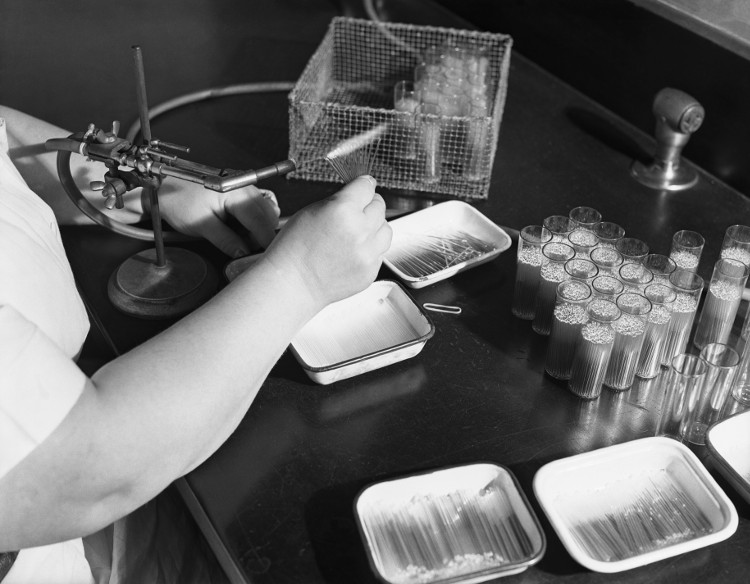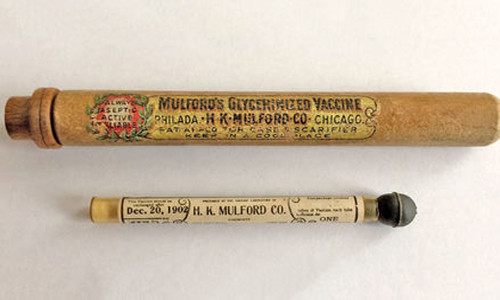New discovery about the source of smallpox vaccine preparation
Smallpox vaccine can be prepared from horse bean virus, not cowpox virus, as experts think.
According to new research by Robert Koch Institute in Berlin, Germany, smallpox vaccine, the first vaccine to appear in the world and is considered one of the biggest mysteries in medical history, can be prepared from Newsweek reported on October 11, according to the virus of horse beans , not cowpox .

Experts prepare smallpox vaccine.(Photo: Magnolia Box).
The vaccine for smallpox is produced in 1798 by the British doctor Edward Jenner , the father of modern immunity. Although it has saved countless lives, the scientific community has not been able to accurately understand the mechanism of disease resistance. this vaccine. Doctors and historians believe that it is made from cowpea virus, a disease similar to smallpox.
To conduct the analysis, the team took a smallpox vaccine in 1902, one of the earliest vaccines produced by HK Mulford. The results showed that the vaccine was made from horse bean virus, a similar gene virus but completely different.
"If we give cows one of these three viruses, it will be very difficult to see the difference. In the past, any disease causing pus-like lesions is called cowpea. This is the first time we testify. proving that horse bean virus is used in smallpox vaccine , " Clarissa Damaso, a virus and molecular biologist at the Federal University of Rio de Janeiro, co-author of the study, said.
In the 1930s, scientists analyzed a chicken embryo and found that smallpox virus was not entirely cowpea virus. Smallpox, cowpea and horse beans are different viruses but the same breed.

Scientists analyze vaccine samples produced in 1902. (Photo: Gears of Biz).
It is possible that cowpea and horse bean viruses have been used to produce vaccines that no one knows, Damaso said. Current smallpox vaccines use a different virus called vaccinia , not cowpea or horse beans.
Scientists and historians used to believe that smallpox vaccine was developed from cowpox virus because Jenner prepared it after draining from the pus of an infected cow milker, who had been exposed to the flood. sick cow. He found that injecting this substance into healthy people could help him to be immune to smallpox.
The World Health Organization (WHO) has declared a complete elimination of smallpox, which has been around for 3,000 years, thanks to the Smallpox Destruction program. The program lasted from 1966 to 1980, marking the first attempt against a disease on a global scale.
The last case of natural smallpox infection occurred in Somalia in 1977, according to WHO. Since then there has been only one case of infection in 1978 due to an unsafe experiment in an out-of-control laboratory in Birmingham, England. The incident caused one death and prompted authorities to make stricter regulations.

Edward Jenner's scene simulation statue vaccines his son.(Photo: Newsweek).
Today, smallpox virus is still stored in rooms stored at the headquarters of the US Centers for Disease Control and Prevention in Atlanta, Georgia, and the Center for Virus and Biotechnology Research (VECTOR) in Novosibirsk, Russia. . Both establishments follow international agreements on the use and control of viruses. WHO also conducts periodic inspections to assess the safety of these facilities.
WHO proposed the destruction of all viruses in 2014, Damaso said. However, it is possible that the international scientific community will not accept this plan. Viruses are very useful for research and development of experimental treatments for many other diseases, such as cancer.
Scientists can add genes from other organisms to the viral genome to study their effects, or add genes that stimulate the immune system against cancer."It's basically used as an intermediary to transport genes since the 1980s , " Damaso said.
Another reason why experts are hesitant to destroy this smallpox virus is that people have not yet found an antiviral drug that can cure the disease. Many experts believe that finding a treatment is a necessary precaution for public health in the future.
"Everyone is talking about the possibility of smallpox appearing again by bioterrorists. We cannot rule out the possibility of not using vaccines any more," Damaso said.
- The experiment on an 8-year-old boy was the source of the invention of the vaccine
- Preparation of vaccine for smallpox and anthrax
- Smallpox kills billions of people and how medicine defeats them!
- Preparing vaccines against smallpox from plants
- Treat liver cancer with smallpox vaccine
- Prepare vaccine from gold
- Create a vaccine for meningitis
- A breakthrough in preparing malaria vaccines
- The United States accelerates testing of Ebola vaccine in humans
- Harvard University developed a mobile vaccine without cold storage
- Canadian scientist 'revives' the extinct virus that once killed 500 million people
- Cuba successfully developed a lung cancer vaccine
 Green tea cleans teeth better than mouthwash?
Green tea cleans teeth better than mouthwash? Death kiss: This is why you should not let anyone kiss your baby's lips
Death kiss: This is why you should not let anyone kiss your baby's lips What is salmonellosis?
What is salmonellosis? Caution should be exercised when using aloe vera through eating and drinking
Caution should be exercised when using aloe vera through eating and drinking